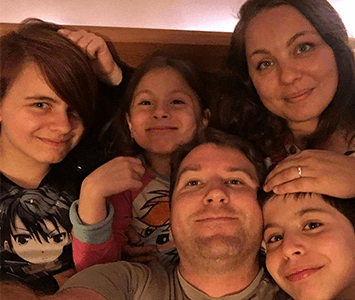Michelle is the Involvement and Engagement Coordinator for Dimensions, an Autism Ambassador and mum to three autistic children. She does a lot to improve understanding and opportunities so we asked her to write a blog for World Autism Awareness Day.
To prepare for Autism Awareness Day I have been busy helping Dimensions with their exciting new autism friendly partnership with Belong by GAME.
I have also been reflecting on autism awareness and what I can do to help.
Many autism charities agree that, thankfully, we have lots of awareness. So, they’ve turned their attention to autism understanding and acceptance.
I’ve always been a positive advocate of neurodiversity and I believe that many people don’t suffer from autism, they suffer from the world around them.
This is because other people sometimes don’t understand how they think and sense the world differently.
I’ve seen adults leave jobs because of vast open plan offices and children self-harming because school is too overwhelming.
Families become dangerously isolated because they just can’t leave the house. The toll on mental health is significant.
According to the National Autistic Society, only 16% of autistic adults are in full time paid employment, despite most adults wanting to work.
Lack of understanding is not about just hurting people’s feelings, it can really disable people.
I encourage you to find out about autism so you know how you might be able to make changes in your environment, whether it’s home, school or work.
What can you do to help people who have autism?
My daughter, Lauren, helped write these tips for Dimensions autism friendly training. We’d like to share them with you…
Change the environment
Dimensions helped make their Head Office more autism friendly by providing a guide for visitors, a quiet room, signs, sensory toys and training.
Even little rules like no hot food at desks or a one page profile for every colleague can make a big difference.
Eye contact
Don’t expect eye contact, this is just not comfortable for me and I find it hard to concentrate on the conversation.
Listen
Don’t assume my silence is because I don’t understand. I am really intelligent but I can struggle to talk. Be prepared that sometimes I want to talk a lot because I know a lot about the topic or I’m really excited.
Patience
Autistic people can find it hard to block out background noise, lights and colours to focus on the conversation, so allow at least 6 seconds of thinking time.
Help me choose
Lots of options can be overwhelming so instead of saying “what would you like?” perhaps start by asking specific questions, such as “would you like a fizzy or still drink?” and “would you like to go to the food shop?” Try not to give too much information if it’s not necessary.
Empathy
Some people can say hurtful or rude things when stressed but please don’t take it personally, they might be having trouble communicating their distress. Show understanding. This may be the only time my family and I are able to go out together because we can be ourselves without fear of judgement.
Don’t rely on words
Learn basic Makaton such as drink, food and toilet. Or use physical objects such as a bag of sweets. This can help reduce stress as the focus is on the object or hands and not my face.
Help me plan
Try to be specific but don’t make promises you can’t keep. I will get really worried if the queue is longer than you said.
Think literally
Avoid jargon, slang and metaphors. Just say what you mean!
Independence
Put up plenty of signs and provide information before I come so I don’t always have to ask for help.
Personal space
I might not like being touched. I know you mean well but it can stress me out. Everyone’s experience of autism is different so be aware that some people find it hard to understand personal space and they might want to hug you or take your hand. If you don’t want this then please gently and firmly tell them what they should do instead.
Download this poster for more tips on understanding autism
_
About the author
Michelle has three autistic children and various other conditions and is the Involvement and Engagement Coordinator at Dimensions, where diversity really is embraced.
Michelle also founded a support group for people who are interested in autism, called Aspergers Adventures – Minecraft and Meltdowns and is also an Autism Ambassador.
She was involved in the All Party Parliamentary Group for Autism campaign which achieved compulsory autism training for teachers, as featured in this BBC news report filmed during her annual autism family event, the #BigDayIn.
Follow Minecraft and Meltdowns on Twitter
Like Minecraft and Meltdowns on Facebook
